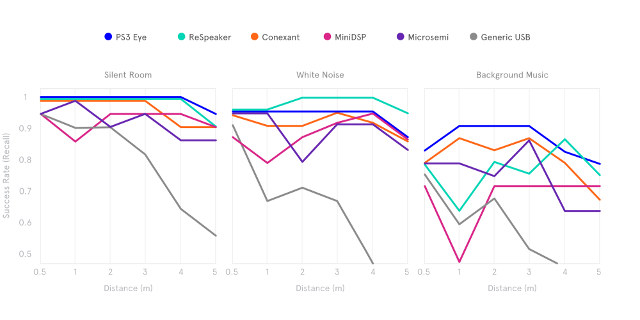Since I started looking more into smart speakers, including DIY ones such as the I made with Orange Pi Zero board + Google Assistant with a single microphone, I was told about the importance of microphone arrays, but so far, I had not seen any clear study or data about that. That changed today, as I came across a review of mic arrays by the makers of Snips Voice Platform. They tested five arrays connected to a Raspberry Pi 3 with the system, and also added a generic USB microphone to the mix. The results speak for themselves…

In that experiment, they measured the rate at which a hot word was successfully detected by incrementally increasing the distance between 0.5 meters to 5 meters (16 ft), and for each distance, repeating the hot word 25 times at 3 second intervals using pre-recording to keep the voice level constant, and the same gain for all microphones. They did so in a silent room, a room with white noise, and finally one with background music. The generic USB microphone works just as well as mic arrays in a silent room up to 2 meters, but further away, the success rate drops dramatically.
The case for the arrays is even better when white noise is added, as the USB microphone’s success rate is only comparable around 50 cm away. When you add background music to the mix, it’s a bit messier, with the USB microphone performing even worse than with noise, and while microphone arrays’ success rate drop, most managed fairly well. The best array based on that test is PlayStation 3 Eye, which comes with 4 microphones and costs just $8 US on Amazon, significantly cheaper than any competitors in the test including the USB microphone… ReSpeaker does not perform too bad either, and MiniDSP appears to be the weakest of the lot, especially for tests at one meter, despite using the same XMOS XVSM-2000 chip on in ReSpeaker array.

Jean-Luc started CNX Software in 2010 as a part-time endeavor, before quitting his job as a software engineering manager, and starting to write daily news, and reviews full time later in 2011.
Support CNX Software! Donate via cryptocurrencies, become a Patron on Patreon, or purchase goods on Amazon or Aliexpress




